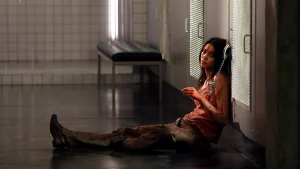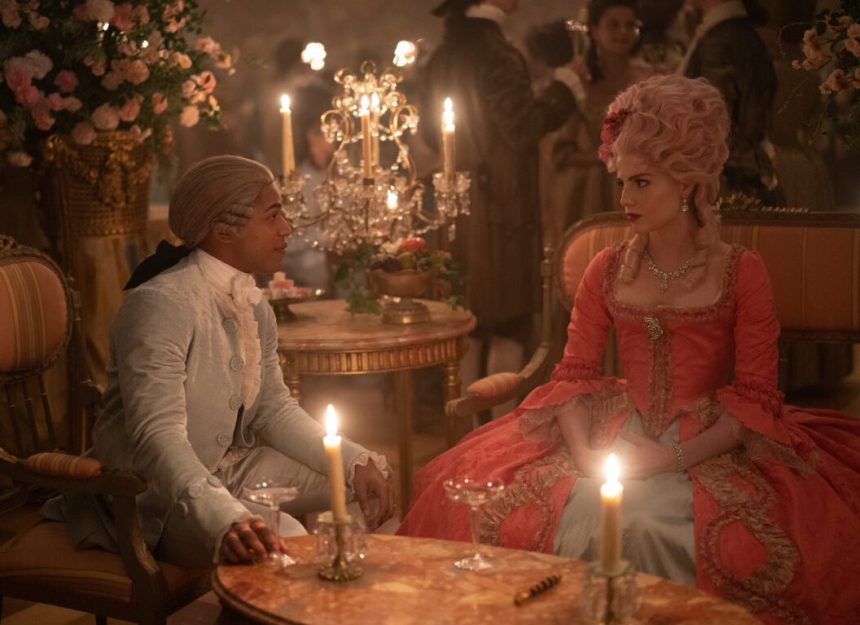
CLASSICALLY BOLD
Over the years, the dramatic efforts of biopic endeavors have been something of a cinematic fascination with Hollywood, finding filmmaking talents both in front and behind the camera flocking to be a part of these theatrical motion pictures. While the idea of creating a biographical feature film about someone and / or some event isn’t anything new, it is something that’s quite beguiling of capturing the essence / mystique of a character who is based in real life and presenting he / she for a dramatic picture. Some of these endeavors might shed light on their entire life (providing the “life and times” of a particular person), while others might focus on a particular moment and / or a significant point of their lives. Recently, Hollywood has somewhat basked in the idea of creating biopic dramas; finding many talented actors / actresses getting their chance to shine and “dig deep” within their characters to create some powerful and sometimes high caliber performances of their careers as well as unearthing untold stories of several unsung heroes and / or pioneers of their era. In truth, biopic dramas can pull from many stories of famous individuals from famous leaders (The Queen and Lincoln) to powerful figures of state (Darkest Hour and Vice), to real-life scenarios of unsung heroes (Sully and Patriots Day), to business moguls (Steve Jobs and The Founder), to musicians (Straight Outta Compton and Bohemian Rhapsody), and to literature minds (Finding Neverland and Goodbye Christopher Robin). Now, Searchlight Pictures (along with Element Pictures and TSG Entertainment) and director Stephen Williams present the latest film in the biographical cinematic realm with the release of Chevalier, a theatrical movie into the untold tale of talented virtuoso Joseph Bolgone. Does this film find an “instrumental” balance between cinematic presentation and historical truth or is it a mellow drama period piece that gets lost within its own narrative conventions?
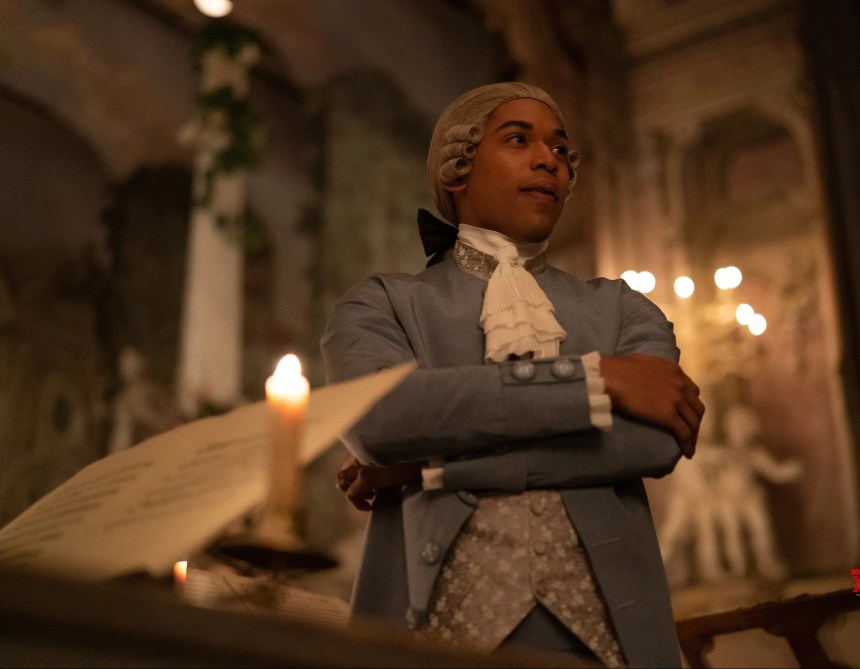
THE STORY
Set during the pre-revolution days in Paris, France, Joseph Bolgone (Kelvin Harrison Jr.) is a master artist with a violin, building quite a name for himself with performances that mesmerize audiences, including seeking the attention of France’s royalty, Marie Antionette (Lucy Boynton), Become so enamored with the musician’s talents, the Queen of France bestows upon Joseph the title of “Chevalier” status (Chevalier de Saint-Georges), with the biracial man becoming a trusted companion to the Antoinette’s court. Looking to further develop his fame and musical bravado, Joseph sets his sights to become the director of the Paris Opera, seeking the Queen’s favor for approval of such an appointment, with Marie electing for a competition with rival composer Christoph Gluck (Henry Lloyd-Hughes), with the men working on musical opera compositions for the position of the head of the opera organization. Such a task invigorates Joseph, enticing him to set out and build a team of professionals capable of bringing his visionary opera piece to life, including the sudden recruitment of Marie-Josephine (Samara Weaving), a young and prolithic singer as well as the wife of the Marquis de Montalembert (Marton Csokas), who sees jealousy in Chevalier’s work rather than opportunity. As Joseph’s work comes together, a mutual attraction bring him and Marie-Josephine closer, with the pair finding a romantic connection with each other, while Joseph’s slave mother, Nanon (Ronke Adekoluejo) comes back into her son’s life, which complicates their relationship. On top of that, the restlessness of France is beginning to reach a critical level, with the commonfolk taking up arms against the monarchy and the nobility; something that draws passion to Joseph and draws ire concern from Marie Antoinette.
THE GOOD / THE BAD
Borrowing my opening paragraph (and this one as well) from my review of 2019’s Tolkien and 2021’s Son of the South…. within the many viewings of movies that I’ve seeing over the years, biopic dramas features are (to me) quite endearing to watch. Most of these endeavors are pretty well-made and usually a sense of “Oscar-bait” and / or “award contenders” from upcoming award seasons in Hollywood. To that degree, the features being told have also been quite compelling to watch, especially ones that uncover the lives of pronounced individuals and the affect that they left on history (be it entertainment industry, literary realms, or even in historical affairs of nations). Of course, this also brings out some captivating performances from some of Hollywood’s best and brightest actors and actresses as well as showcasing some unknown talents. Some of my personal favorites include Lincoln (love Daniel Day-Lewis in that movie), Finding Neverland (such an endearing / magical story), Darkest Hour (Gary Oldman’s commanding performance was great), and Elvis (love the music and Butler’s performance as Elvis Presley). Altogether, while the practice of producing biopic features isn’t exactly new, the past few years have reached the pinnacle age of biographical storytelling for moviegoers.
This brings me back around to talking about Chevalier, a 2023 biographical drama and the cinematic look into the life of celebrated violinist Joseph Bolgone. To be quite honest, I really didn’t hear much about this movie until I saw the film’s movie trailer a few months back. I can’t remember where I saw it, but I decided to view the preview online (somewhere) and I was definitely interested in the narrative of the feature. From the trailer alone, the movie looked to be right up my alley. Of course, I’m talking about a costumed period piece, which I’m a sucker for in both big and small screen presentation. Thus, I was immediately hooked on wanting to see Chevalier just for its sheer visual presentation alone. Plus, the story looked intriguing, especially since it was going to cover (or rather uncover) an unknown tale about a African-American musician in the time era, with many calling him to be the “Black Mozart”. In addition, I do remember seeing the film’s movie poster early on at one of the movie theaters that I usually go to for bigger blockbuster features and (from that alone) was intrigued. So, I was definitely curious and excited to see Chevalier when it was set to come out on April 21st, 2023. I did get to see the movie during its opening weekend, but, due to my work schedule, I had to push back my review for the movie. Now, with some free time, I’m finally ready to share my personal thoughts for this particular period piece drama. And what did I think of it? Well, I really liked it. Despite some narrative plots that overreach the ambition of the feature, Chevalier is a wonderful costumed period piece drama that evokes a lot of today’s world piece within the context of the pre-revolutionary time period in France. It may not be the best biographical drama to come out of Hollywood, but, given the performances and the engaging tale to be told, the movie is executed and presented in a fashionable style and cinematic delight.
Chevalier is directed by Stephen Williams, whose previous directorial works include such TV series project like Lost, Person of Interest, and How to Get Away with Murder. Given his background of working on episodic TV series endeavors (as well as TV movies), Williams makes Chevalier his most ambitious project to date. While he isn’t unfamiliar of doing feature length films, Williams certainly makes the project his most poignant piece of his career. To that end, I believe that Williams succeeds and gives this particular movie a palpable and cinematic taste within the narrative context. Indeed, the story being told in Chevalier is a good one, with Williams able and willing to frame the feature around the character of Joseph Bolgone in a way that doesn’t constrict or contradict what’s being told. Naturally, some “based on the true story” endeavors on biographical projects have stories to tell, with some being quite meaningful narrative to tell, sometimes fall short in bringing such tales to cinematic light and fade into moviemaking obscurity. Thankfully, that is not the case with Chevalier, with Williams approaching the subject matter with a delicate touch of respect for who Joseph Bolgone was and shedding light on his story. Its’ through this presentation and direction that the movie shines, with Williams building the feature around the character of Joseph by making him the true focal point of the feature.
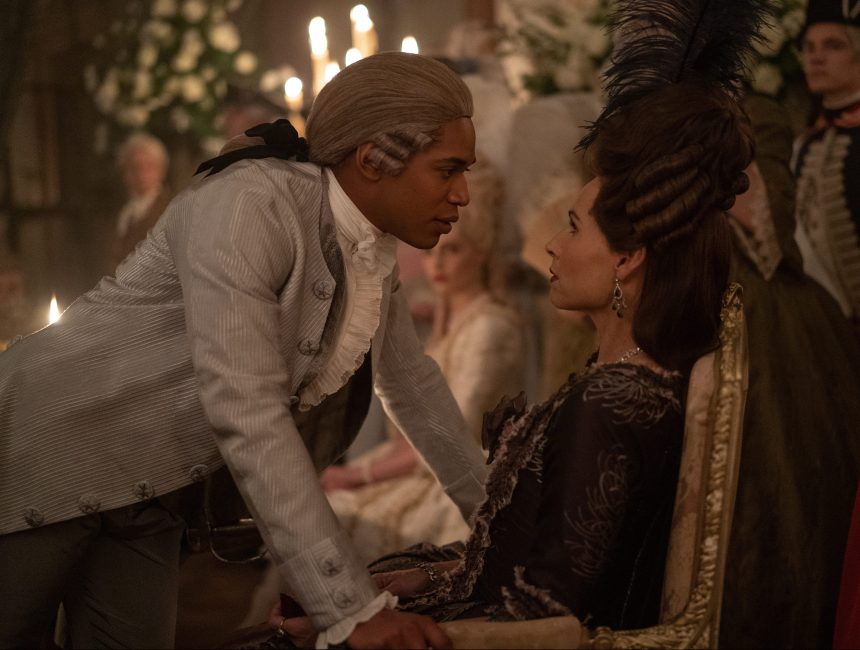
This is most apparent in the film’s opening salvo scene, with Joseph interrupting a concert affair with Mozart and upstages the widely known musician at his own game. It’s definitely a very curious (yet fun way) to open a period piece feature, which heightens the affects that the movie has the rest to play with. This also sets up the stage for picture as Williams keeps the movie at a costumed period piece endeavor, yet still can speak to a modern area. In addition, Williams also touches upon several key interesting aspects throughout the movie, including racisms, society classism, and the injustice of those who are not in the upper echelon hierarchy. These, of course, are very transparent to today’s world, with many viewers can easily extrapolated these meanings and problematic areas into modern society. As a sidenote, as I mentioned above, I am a sucker period piece dramas and this film certainly takes the cake in that regard. Forbidden love, court intrigue, a backdrop setting of a brewing revolution powder keg, and the talents of an influential man are all mixed together and definitely adds layer to this production. Thus, if you are looking for something along the lines of Bridgeton (i.e., great costume and beautiful looking people, etc.) then Chevalier might be right up your alley.
Additionally, the script, which was penned by Stefani Robinson, offers up plenty of nuances to help fill out Joseph’s story. There are a lot of narrative / character threads that intersect and intertwine in his life story, so it’s quite interesting to see how things play out in the movie. With Robinson’s script, Chevalier is teeming with colorful drama and allows Williams to helm the sequences of events in a very dramatic way; finding the Chevalier de Saint-Georges to be a very multi-faceted character to follow and delve into many different challenges and obstacles that he must face. Also, the film’s runtime is rather lean, which is both kind of good and bad (more on that bad below). Still, the movie, which has a runtime of 107 minutes (one hour and forty-seven minutes), does keep everything moving at a steady pace, with the feature never really lingering too much on a certain subplot point nor never creating unnecessary bloating throughout. Overall, I think that Williams did a pretty good job in bringing to light Joseph Bolgone’s story to life and made Chevalier a very poignant and meaningful motion picture that is wrapped up with music and drama beautifully.
For its presentation, Chevalier gives a phenomenal and an absolutely gorgeous presentation that really delivers a lot of praise and notoriety within its undertaking. Given the fact that the movie is to be considered a “period piece”, I knew that the background setting and / or visual aesthetics was going to be beautiful and lavishing with detail, but I do have to admit that I really loved this particular nuance within the setting portrayal of the feature. Everything from this display….set pieces and decorations to hair and make-up, and event the costume….are so impressive detailed and creatively done that it creates a very heightened feeling of the late 18th century France. Thus, the film’s “behind the scenes” key team players, including Karen Murphy (production design), Gemma Randall (art direction), Lotty Sanna (set decorations), Oliver Garcia (costume design), and the entire hair / make-up team for their colorful and theatrically bold efforts in making Chevalier looks visually stunning to behold. Speaking of visuals, the cinematography work by Jess Hall are also quite good throughout the entire film, especially in a few dramatic poise shots that help capture some cinematic moments. Lastly, the movie’s score, which was composed by Kris Bowers, is brilliant throughout Chevalier, with his musical composition adding to the overall flavor of the feature and helps build upon many of the scenes…..be it a quieter dialogue driven moment or a rousing sequence of clarity.
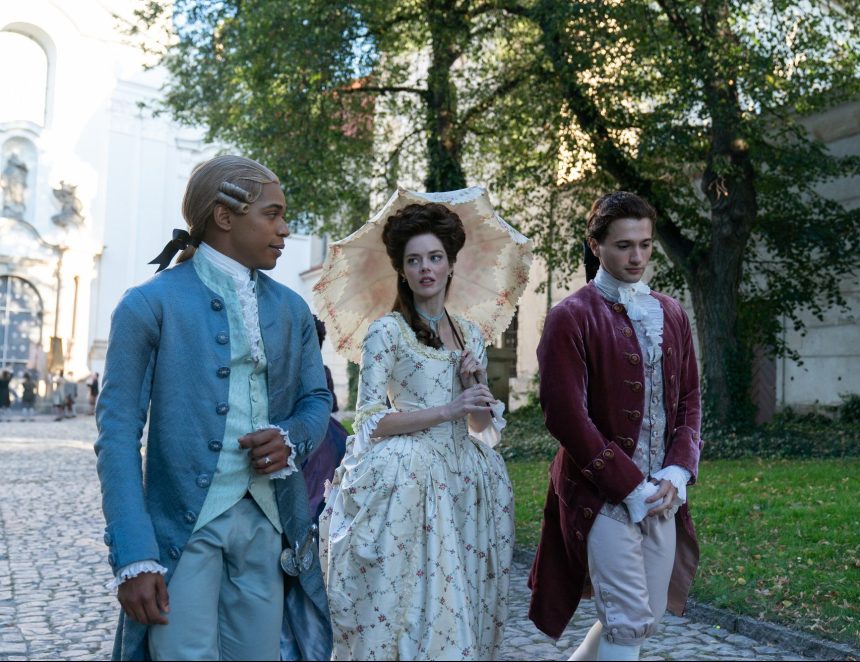
Alas, there were a few points of criticisms that I had with the movie, which diminishes Chevalier slightly within its cinematic presentation and overall execution. How so? Well, for starters, the film itself can’t make the fullest extent of the story it wants to tell. What do I mean by that? Well, despite its very lean runtime, Chevalier has a lot it wants to say within its plot. Of course, the story of Joseph Bolgone is the main crux of the feature, but there are plenty of others subplot threads that are presented that could’ve been further developed throughout the movie. This includes Joseph’s relationship with his recently reunited mother (Nanon), his fallout with Marie-Madeleine Guimard (the ramifications of it), his rivalry competitor Christoph Glock, losing favor with Marie Antoinette, and his part in the revolution. It’s all there and presented to a certain degree in the movie, but Williams, along with Robinson’s script, bite off more than the movie can chew, which makes the film itself a little bit light on those certain topics and not enough to fully delve into those threads as much as intended. Furthermore, certain supporting narrative threads for some of these characters get quickly dropped halfway throughout the movie and are sort of left dangling by the time the film reaches its conclusion. Of course, this tactic kind of reminded me of The Banshees of Insherin, with the main story of the primary two characters takes center stage and a lot of the subplots taking a backseat or in the backdrop of the film’s setting. Chevalier takes a similar approach and places a larger emphasis on its main lead character, with all the supporting characters sort of pushed aside and having a few playing important small parts.
In a more minor capacity of criticisms, Chevalier also doesn’t show much of the actual piece that Joseph had created. Yes, the movie showcased that he was a celebrated musician (and very talented) and who was a favor of the Queen’s inner court, but we (the viewers) don’t exactly get to see much of him actually composing music (only a brief few scenes here and there) or to hear of his actual composition. I do understand that most of his works were lost (due to raptures of time and France’s leadership disowning his pieces), but I would’ve liked to be seeing the creative process of what made Joseph Bolgone a brilliant musician and how he became such a very well-mannered virtuoso in Marie Antoinette’s court. Also, another minor point of criticisms that I had with the film is that it rather ends abruptly and in a incomplete way. I do get where Williams wants to end the feature on, which gives the context of where the character of Joseph ends up, but the movie could’ve added a lot more, especially given how lean the movie’s runtime is. The text presented before the end credits gives the potential that could’ve been a more action-packed and / or meaningful conclusion to Chevalier’s story, so this missed opportunity is kind of felt during the final moments of the picture. Again, this two points are more of minor criticisms that possible could’ve been benefit to the feature’s final cut.
The cast in Chevalier is great across the board, with every selected acting talent involved on this project delivering a solid performance in their respective characters. Perhaps the only problem is that (as mentioned above) some don’t exactly get their proper character development to the fullest extent, but, given the notion that the feature’s story is mostly centered around the primary lead of Chevalier de Saint-George, this can be a little bit forgiven. Leading the charge in the film as Joseph Bologne, who is played by actor Kelvin Harrison. Jr. Known for his roles in Cyrano, Elvis, and The Trial of the Chicago 7, Harrison. Jr has certainly become a somewhat rising star in Hollywood and has begun to amass a lot of roles throughout his career in both supporting and lead roles. In Chevalier, he takes command (and centerstage) in his portrayal of Joseph Bologne and does a masterful job in the role. Harrison Jr. balance every particular aspect of Joseph’s whirlwind life and the people he interacts with, which certainly affects his behavior and mood throughout. This, of course, gives Joseph a very multi-faceted personality, with Harrison Jr. imbuing the character with such subtlety and expressiveness that it certainly creates a very intriguing character right from the get-go. He easily displays the elation, ego, and frustration that Joseph Bologne must have felt during this time, with the actor presenting a wide range of emotion through facial expression and body language as well as his dictation in his voice. It’s quite a riveting performance, especially since he himself certainly carries the feature on his shoulders…. of which he does with great effect. In the end, whether you loved or hated the movie, no one can deny the captivating performance that Harrison Jr. cultivated in his portrayal of Joseph Bolgone.
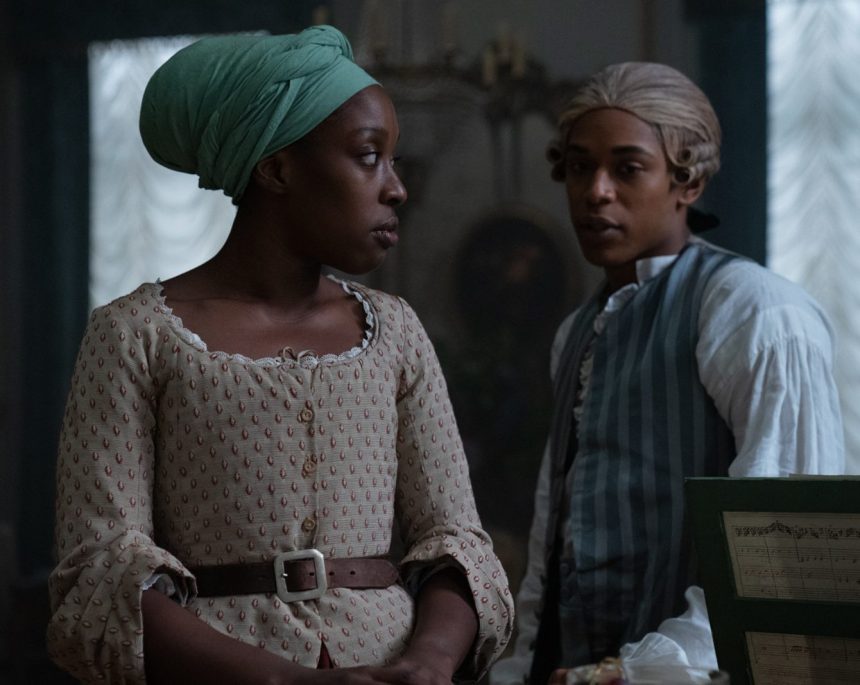
Behind Harrison Jr.’s portrayal of Chevalier de Saint-Georges, the film has several supporting character roles (although large and important ones to the tale) are the women that play a part of Joseph Bologne’s life, including France’s infamous Queen Marie Antoinette, his illicit lover of Marie-Josephine, and his mother Nanon, who are played by actresses Lucy Boynton (Bohemian Rhapsody and Murder on the Orient Express), Samara Weaving (Ready or Not and Babylon), and Ronke Adekoluejo (Been So Long and Christopher Robin) respectfully. These three particular female characters play a central part in Joseph’s life in the movie, with Antoinette showcasing the impulsiveness and sometimes naivete that the late Queen of France was known for, the spiritual kindred spirt / romantic freedom that was found in Marie-Josephine, and that sometimes awkward reconnection feeling between mother and son in Nanon. Of course, Boynton, Weaving, and Adekoluejo are excellent in their respective roles and certainly gives their respective characters that certain type of cinematic light that gives context to the feature’s narrative. Plus, the screen time that these three actresses share with Harrison Jr. is also quite magnetic and delivers upon the relationships that their characters share with his.
The movie also has a list of supporting characters that make up several important players in Joseph’s story in Chevalier. This includes actor Alex Fitzalan (The Society and Slender Man) as Joseph’s close friend Louis Philippe II / Duke of Orleans, actor Marton Csokas (Kingdom of Heaven and xXx) as Marie-Josephine’s husband Marc Rene / Marquis de Montalembert, actor Henry Lloyd-Hughes (The English Game and Killing Eve) as Joseph’s rival for Paris Opera director Christoph Glock, actress Sian Clifford (Fleabag and Life After Life) as Joseph’s financial backer for his opera Madame De Genlis, and actress Minnie Driver (Speechless and The Phantom of the Opera) as famed opera singer Marie-Madeleine Guimard. While all of these acting talents are spot on in their respective characters (and plays them quite well), the only problem that I have is that some of them (characters) don’t exactly pan out the correct way. It’s quite easy to see where certain aspects of the film were trimmed down for the feature’s slimmer runtime and where these side characters could’ve been further developed. Again, I fully understand that Williams and his team wanted to give a large focus on Joseph, but these particular characters were definitely ripe for more screen time and further development, especially since they play in Joseph’s narrative.
Rounding out the rest of the cast, including actor Jim High (Last Light and A Small Light) as Joseph’s biological father George Bolgone, actor Ben Bradshaw (Knightfall and The Office) as La Boessiere, actor Alec Newman (Dune and Strike Back) as actress Jessica Boone (Missing and Dark Water) as La Arnould, actress Tereza Matlova (ordinance v ruzove zahrade 2) as La Levasseur, actor Sam Barlien (Carnival Row and Hunting) as King Louis XVI, and actor Joseph Prowen (Midsomer Murders and Decline and Fall) as Mozart, are delegated to minor supporting characters in the movie. While most of these players only have one or two scenes in the feature, the acting talent behind them is good all the way around, with a few making a memorable spotlight moment (i.e. Prowen’s Mozart during the opening scene).
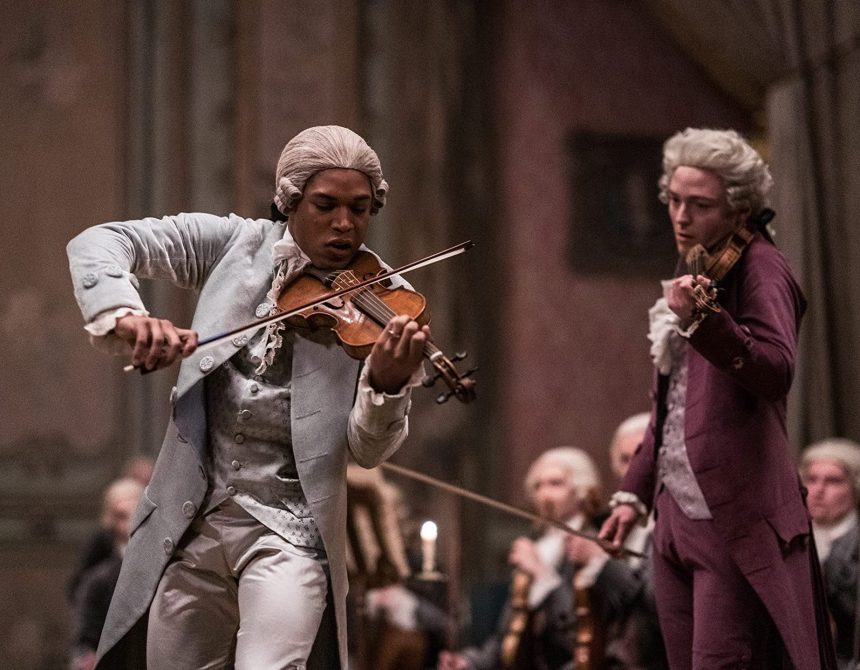
FINAL THOUGHTS
Prodigy, lover, revolutionary, and legend are all characteristics found in Joseph Bologne, Chevalier de Saint-George, as he finds place (and music talent) during France’s twilight years of the nation’s revolution in the movie Chevalier. Director Stephen Williams latest film takes an examination into the life of an untold musician, whose gifted talent was unprecedented during his era, yet gets entangled in forbidden love, prejudice, and the greater machinations of French history. While the movie struggles in trying to fully encompass everything the narrative wants to explore, the films still manages to make a compelling motion picture, especially thanks to William’s direction, an intriguing tale of Joseph’s life, a fantastic presentation (costumes / hair and make-up), a great score, and a solid cast of talent individuals, including Harrison Jr. in the lead role. Personally, I really liked this movie. Yes, the movie definitely could’ve added a whole lot more with a lot of the subplots and backdrop setting, but the end result is still a worthwhile piece of period piece drama for some great entertainment, especially since the movie itself does a good job in bring Joseph’s story to light. Also, the movie does what it sets out to do by exploring the life of an unsung musician and the mark he left on that time period. Plus, as mentioned, I’m a huge sucker for costume period pieces and this one was visually stunning and I felt that Harrison Jr. was magnetic in the film. Thus, my recommendation for this movie is a widely “highly recommended” one, especially for those who are looking for features that unearth “untold” biographical narratives as well as a lavishing presentation of period piece variety (something akin to Bridgerton or Gilded Age). In the end, Chevalier, while not quintessential bio-pic drama from recent Hollywood, still soars higher than what I was expecting, position the motion picture that is brimming with character, educational in its study of Joseph Bologne, and enticing its viewers in its classically bold presentation.


